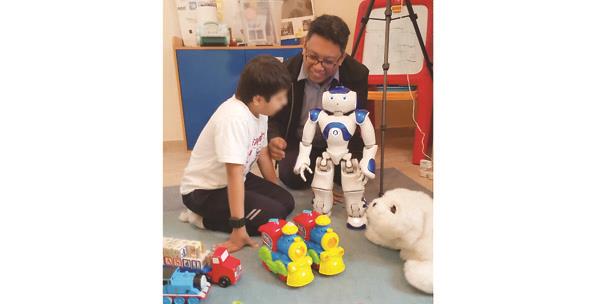
Qatar- Unique therapy for kids with autism likely
By Fazeena Saleem
DOHA: Social robotics is likely to be introduced in Qatar to provide therapy for children with autism as a result of a Qatar University (QU) research.
As people with autism have trouble in communicating with others social robotics could be used to help improve their interaction with others.
The research reviews the use of socially interactive robots to assist in the therapy of children with autism.
The extent to which the robots have been successful in helping children with social emotional and communicational deficit has been investigated said Dr John-John Cabibihan Associate Professor of Mechanical and Industrial Engineering QU.
Showing a video of an experimental session at a centre for children with special needs Dr Cabibihan said “When a child is taught to brush his teeth with a robotic they get more attracted to it. Then the child is left alone with the robotic and tries it out on his own. We also use dancing robotics so the child would learn to copy behaviours. The advantages of robotics are compared to human therapists but we are not to remove humans we use robotics as an intermediary mediator” he said.
Although using social robotics for autistic therapy for children is practised in some countries it is being examined in Qatar to make it more relevant to local culture and language.
The research under way since 2012 under a QU grant will also check internal changes in children by testing their heart beat and sweat levels. It would also examine the development of social robotics to meet the needs of children with autism.
Autism spectrum disorder and autism are general terms for a group of complex disorders of brain development. The disorders are characterised in varying degrees by difficulties in social interaction verbal and nonverbal communication and repetitive behaviours.
World Autism Awareness Day on April 2 every year encourages the member states of the United Nations to take measures to raise awareness about children with autism.
The day was designated by a UN General Assembly resolution adopted in 2007 after it was proposed by
H H Sheikha Moza bint Nasser UN Representative from Qatar.
Today autism awareness fundraisers will be held across the world and buildings and landmarks will be bathed in blue light as part of the campaign.
It is not clear what causes autism.
There are theories but none is definitely proven.
The prevalence of autism is on the alarming rise with some studies suggesting an increase of 10 to 17 percent annually in the past several years.
Although there are no specific figures about the incidence of autism in Qatar the number of centres for children with special needs has seen a drastic increase.
Between 1992 and 2000 there were four centres but the number increased by 250 percent in 2014.

Legal Disclaimer:
MENAFN provides the
information “as is” without warranty of any kind. We do not accept
any responsibility or liability for the accuracy, content, images,
videos, licenses, completeness, legality, or reliability of the information
contained in this article. If you have any complaints or copyright
issues related to this article, kindly contact the provider above.




















Comments
No comment